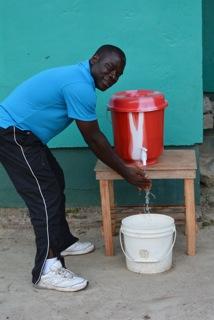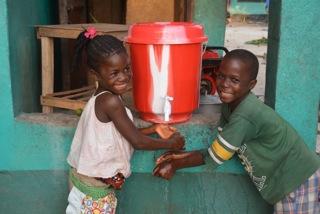A Liberian pastor tries to stop the spread of Ebola, one house at a time
Children in Lower Johnsonville, Liberia, wash their hands, August 3, 2014.
Ebola came to Liberia in March. The virus, spread through contact with bodily fluids of infected people, moved very fast. Within a week of the first confirmed case, seven Liberians had died.
A pastor, who travels throughout the country, warned his congregation at the Eternal Love Baptist Church in Lower Johnsonville. "I told them, we need to take this information serious, because it's dangerous to the community of Liberia," Pastor Peter Flomo says. "Because Liberia is a community that's full of congestion. You go to the hospital, the banking hall, the school, in the street, people are just congested. There's no such thing in Liberia like space."
Pastor Flomo has firsthand experience with ebola. A member of his congregation, Esther Kesselley, was one of the early casualties of the outbreak. A nurse at the government-run Redemption Hospital outside Monrovia, Kesselley was the first Liberian healthcare worker to die from Ebola. But not the last.

Pastor Flomo says concern about transmission of Ebola has changed the way his church conducts funerals. The body is not present, Flomo says. "We do what we call memorial services, but will not allow the corpse to come into church service."
Families of people infected with Ebola get a pastoral visit from Flomo. He says the first thing he does is lead them in prayer. "The second thing is to educate them to follow proper hygiene," he says. "Cleanliness is the rule of the day. Wash your hands, do the procedure before the kids eat. Use bleaches. Clean the blanket. Clean the beds. I'm educating them. Let's do it."
Easier said than done. Most homes in Liberia do not have proper sanitation. So Flomo is raising money to buy plastic buckets. One for every household in Liberia, he hopes. The bucket holds a solution of water and bleach, and has a faucet at the bottom.
It's to encourage everyone to wash their hands.
"You come into the home, before the entrance of the house. All will wash their hands," says Flomo. "They have to have their hands washed with the bleach water in the bucket." Pastor Flomo is getting help from a US-based charity, Teamwork Africa, which is buying the bleachwater buckets in bulk.
As the infection rate of Ebola rises among Liberians, Flomo remains optimistic. "Even though Ebola is incurable," he says, "we know we can eradicate it, we can minimize the spread of Ebola."
Audio for this report was courtesy of Fusion Productions, recording on location in Liberia.
Ebola came to Liberia in March. The virus, spread through contact with bodily fluids of infected people, moved very fast. Within a week of the first confirmed case, seven Liberians had died.
A pastor, who travels throughout the country, warned his congregation at the Eternal Love Baptist Church in Lower Johnsonville. "I told them, we need to take this information serious, because it's dangerous to the community of Liberia," Pastor Peter Flomo says. "Because Liberia is a community that's full of congestion. You go to the hospital, the banking hall, the school, in the street, people are just congested. There's no such thing in Liberia like space."
Pastor Flomo has firsthand experience with ebola. A member of his congregation, Esther Kesselley, was one of the early casualties of the outbreak. A nurse at the government-run Redemption Hospital outside Monrovia, Kesselley was the first Liberian healthcare worker to die from Ebola. But not the last.

Pastor Flomo says concern about transmission of Ebola has changed the way his church conducts funerals. The body is not present, Flomo says. "We do what we call memorial services, but will not allow the corpse to come into church service."
Families of people infected with Ebola get a pastoral visit from Flomo. He says the first thing he does is lead them in prayer. "The second thing is to educate them to follow proper hygiene," he says. "Cleanliness is the rule of the day. Wash your hands, do the procedure before the kids eat. Use bleaches. Clean the blanket. Clean the beds. I'm educating them. Let's do it."
Easier said than done. Most homes in Liberia do not have proper sanitation. So Flomo is raising money to buy plastic buckets. One for every household in Liberia, he hopes. The bucket holds a solution of water and bleach, and has a faucet at the bottom.
It's to encourage everyone to wash their hands.
"You come into the home, before the entrance of the house. All will wash their hands," says Flomo. "They have to have their hands washed with the bleach water in the bucket." Pastor Flomo is getting help from a US-based charity, Teamwork Africa, which is buying the bleachwater buckets in bulk.
As the infection rate of Ebola rises among Liberians, Flomo remains optimistic. "Even though Ebola is incurable," he says, "we know we can eradicate it, we can minimize the spread of Ebola."
Audio for this report was courtesy of Fusion Productions, recording on location in Liberia.
Our coverage reaches millions each week, but only a small fraction of listeners contribute to sustain our program. We still need 224 more people to donate $100 or $10/monthly to unlock our $67,000 match. Will you help us get there today?
